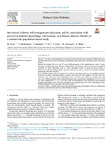2022-04-07Zeitschriftenartikel
Structured diabetes self-management education and its association with perceived diabetes knowledge, information, and disease distress: Results of a nationwide population-based study
Heise, M.
Heidemann, C.
Baumert, J.
Du, Y.
Frese, T.
Avetisyan, M.
Weise, S.
Objective:
To evaluate, how participation in structured diabetes self-management education (DSME) programs is associated with perceived level of knowledge about diabetes, information needs, information sources and disease distress.
Methods:
We included 796 ever- and 277 never-DSME participants of the population-based survey “Disease knowledge and information needs - Diabetes mellitus (2017)” from Germany. Data on perceived level of diabetes knowledge (12 items), information needs (11 items), information sources (13 items) and disease distress (2 indices) were collected. Multiple logistic regression analyses were used to examine the association of DSME-participation with these outcomes.
Results:
DSME-participants showed a higher level of diabetes knowledge compared to never-DSME participants, particularly in aspects concerning diabetes in general (odds ratio 2.53; 95% confidence intervals 1.48–4.33), treatment (2.41; 1.36–4.26), acute complications (1.91; 1.07–3.41) and diabetes in everyday life (1.83; 1.04–3.22). DSME-participants showed higher information needs regarding late complications (1.51; 1.04–2.18) and acute complications (1.71; 1.71–2.48) than DSME never participants. DSME-participants more frequently consulted diabetologists (5.54; 3.56–8.60) and diabetes care specialists (5.62; 3.61–8.75) as information sources. DSME participation was not associated with disease distress.
Conclusion:
DSME is a valuable tool for improving individual knowledge about diabetes. However, DSME should focus more on psychosocial aspects to reduce the disease burden.
Files in this item
Related Items
Show related Items with similar Title, Author, Creator or Subject.
-
2019-06-19ZeitschriftenartikelTypes of diabetes are not limited to age groups: type 1 diabetes in adults and type 2 diabetes in children and adolescents Rosenbauer, Joachim; Neu, Andreas; Rothe, Ulrike; Seufert, Jochen; Holl, Reinhard W.Based on data from the national diabetes registry DPV (Diabetes patient documentation), the diabetes registry of North Rhine-Westphalia and surveys conducted at hospitals and practices in Baden-Württemberg and Saxony, ...
-
2017-05-03ZeitschriftenartikelLongitudinal change in health-related quality of life in people with prevalent and incident type 2 diabetes compared to diabetes-free controls Schunk, Michaela; Reitmeir, Peter; Rückert-Eheberg, Ina-Maria; Tamayo, Teresa; Schipf, Sabine; Meisinger, Christa; Peters, Annette; Scheidt-Nave, Christa; Ellert, Ute; Hartwig, Saskia; Kluttig, Alexander; Völzke, Henry; Holle, RolfObjective: The objective of this analysis is to compare people with prevalent type 2 diabetes, incident type 2 diabetes and without diabetes with respect to longitudinal change in health-related quality of life (HRQOL) ...
-
2012-05-13MasterarbeitEvaluation of the German Diabetes Risk Score as a screening tool for undiagnosed diabetes Paprott, RebeccaBackground: Regional German studies estimated the prevalence of undiagnosed diabetes to be almost as high as the prevalence of diagnosed diabetes. Even before symptoms of diabetes occur, diabetes related secondary diseases ...

